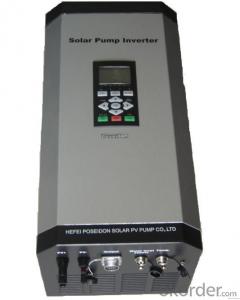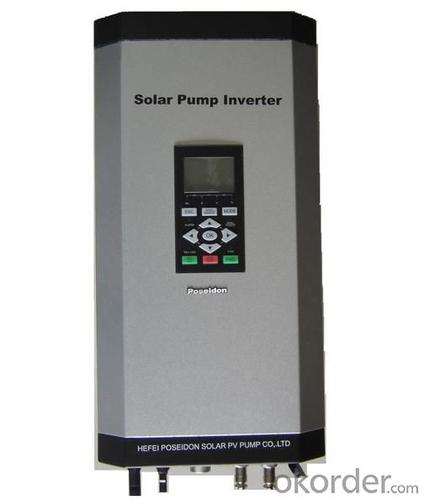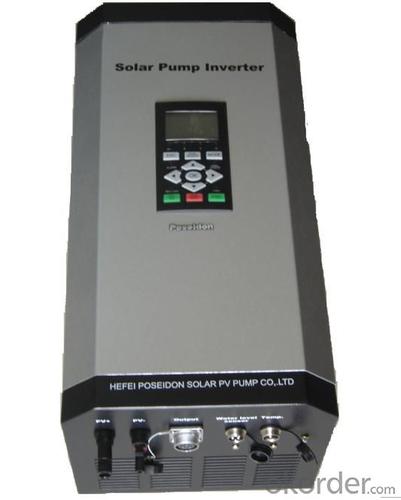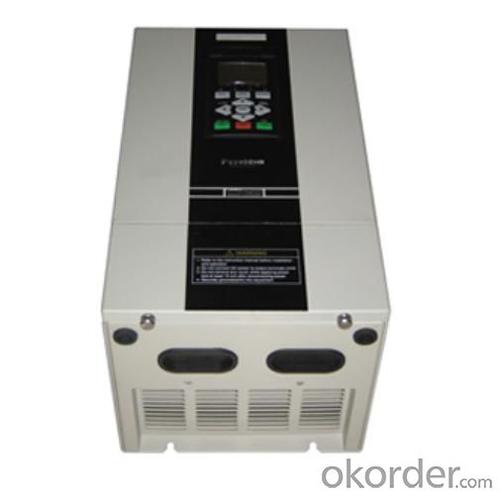Solar Pump for Home FCPM700L Inverter
- Loading Port:
- China Main Port
- Payment Terms:
- TT OR LC
- Min Order Qty:
- -
- Supply Capability:
- -
OKorder Service Pledge
Quality Product, Order Online Tracking, Timely Delivery
OKorder Financial Service
Credit Rating, Credit Services, Credit Purchasing
You Might Also Like
Solar pump inverter FCPM700L Product Description:
Solar water pumping system is constructed with solar panel array,solar pump inverter and AC water pump, DC current produced from solar panel will be delivered to solar pump inverter,and it will convert it into AC current to drive water pump,and will automatically regulate output frequency according to sun radiance intensity,maximally realize MPPT tracking function.
Features
Adopting the proposed dynamic VI maximum power point tracking (MPPT) control method, with fast response, and reliable operation, achieves efficiency of 99%.
Designed with variable frequency driver, greatly improves efficiency
Extremely high efficiency
Digital mode control, with automatic operation and manual operation mode options
Complete protection functions
Adopts intelligent IPM module, with high reliability
LCD display and operation panel, in real time presents operating data
Optional for water level measurement and control circuit
Applicable for general ACC pumps, like centrifugal pump, piston pump etc.
Independent intellectual property; Highly effective, the redundant reliability, exempts the maintenance and the long life.
The pumps are soft started, fully protected.
No batteries are used. So better Sunlight, more water.
Datasheet.
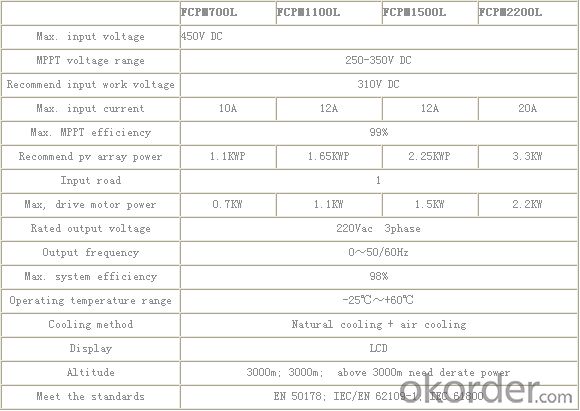
- Q: Can a solar pump be used in combination with a drip irrigation system?
- Yes, a solar pump can be used in combination with a drip irrigation system. The solar pump can provide the necessary water pressure to operate the drip irrigation system efficiently, allowing for precise and controlled watering of plants. This combination is environmentally friendly and cost-effective, as it utilizes renewable solar energy to power the pump.
- Q: Are there any grants or funding options available for installing a solar pump?
- Grants and funding options are indeed accessible for the installation of solar pumps. The availability and eligibility criteria of these grants and funding options may vary depending on your location and specific circumstances. One primary source of funding is government programs and initiatives. Numerous governments offer financial incentives, such as grants, rebates, or tax credits, to promote the adoption of renewable energy technologies like solar pumps. These incentives aim to reduce the initial investment cost and make solar pump installations more affordable for individuals, businesses, or communities. Moreover, non-profit organizations, foundations, and environmental agencies may also provide grants or funding for renewable energy projects, including solar pump installations. These organizations typically prioritize projects that align with their mission and contribute to sustainable development or environmental conservation. To inquire about available grants or funding options for solar pumps, it is recommended to research and contact local government agencies, energy departments, or environmental organizations in your area. They can provide specific information on eligibility criteria, application processes, and deadlines. Furthermore, financial institutions, such as banks or credit unions, may offer loans or financing options specifically for renewable energy projects. These loans can assist in covering the upfront costs of purchasing and installing a solar pump, offering flexible repayment terms and competitive interest rates. In conclusion, while the specific grants and funding options available may differ based on your location and circumstances, there are various opportunities to access financial support for installing a solar pump. It is advisable to explore and consider multiple avenues to maximize potential funding options and make your solar pump installation more affordable.
- Q: Can a solar pump be used for swimming pools or fountains?
- Yes, a solar pump can be used for swimming pools or fountains. Solar pumps are designed to harness energy from the sun and convert it into power to run water pumps. They are an eco-friendly and cost-effective alternative to traditional electric pumps, making them suitable for maintaining water circulation and filtration systems in swimming pools and fountains.
- Q: Can a solar pump be used in areas with limited access to financing options for installation or maintenance?
- Yes, a solar pump can be used in areas with limited access to financing options for installation or maintenance. Solar pumps are an ideal solution for such areas as they are cost-effective and do not require a continuous source of electricity. They can be installed and maintained with minimal expenses, making them accessible to communities with limited financial resources. Additionally, solar pumps have low operating costs, making them a sustainable and viable option for areas with limited access to financing options.
- Q: Can a solar pump be used in areas with limited access to water wells?
- Yes, a solar pump can be used in areas with limited access to water wells. Solar pumps rely on solar energy to power their operations, which means they don't require a connection to the electrical grid or traditional power sources. This makes them an ideal solution for remote areas where access to water wells may be limited or non-existent. Solar pumps can be used to extract water from various sources such as rivers, lakes, or even underground water bodies, providing a sustainable and reliable water supply in areas with limited access to traditional wells.
- Q: Can a solar pump be used for water supply in a community center?
- Yes, a solar pump can be used for water supply in a community center. Solar pumps utilize solar energy to power the pumping mechanism, making them a sustainable and cost-effective solution for water supply in areas where electricity is not readily available. They can provide a reliable source of water for various purposes, including drinking, sanitation, and irrigation, making them suitable for community centers.
- Q: Are there any specific installation requirements for a solar pump system?
- A solar pump system has specific installation requirements that can vary depending on the system's type, size, location, and intended use. To begin, it is important to ensure that the solar panels receive sufficient sunlight throughout the day. Ideally, they should be installed on a roof or in an area with unobstructed access to sunlight. Moreover, the panels should be positioned at an optimal angle to maximize solar energy absorption. In addition, the system should be installed in a location that allows for easy maintenance and repairs. This involves providing enough clearance around the system and ensuring that there are no obstructions that could hinder access to the pump, controller, or other components. Another crucial requirement is the proper sizing and installation of the pump itself. This entails considering factors such as the required flow rate, pressure, and the specific application of the pump system. It is essential to choose a pump that is suitable for the intended use and meets the system's requirements. Moreover, the system should be installed with safety precautions in mind. This includes grounding the system to protect against electrical shocks and ensuring that all electrical connections are adequately insulated. It is also advisable to incorporate a disconnect switch and surge protection devices to safeguard the system from power surges and other electrical issues. Lastly, it is crucial to adhere to local building codes and regulations related to solar pump system installation. This may involve obtaining necessary permits and complying with specific guidelines established by local authorities. Overall, the installation of a solar pump system necessitates careful consideration of factors such as solar panel placement, pump sizing, safety measures, and compliance with local regulations. It is recommended to consult with a professional installer or seek guidance from reputable manufacturers to ensure a successful and efficient installation.
- Q: Are there any limitations on the water hardness or softness that a solar pump can handle?
- Yes, there are limitations on the water hardness or softness that a solar pump can handle. The main concern is with hard water, which contains high levels of minerals such as calcium and magnesium. These minerals can cause scaling and buildup on the pump components, reducing its efficiency and lifespan. Soft water, on the other hand, usually doesn't pose any significant limitations for solar pumps. However, it's important to note that each solar pump model may have specific recommendations and guidelines provided by the manufacturer regarding water hardness, so it's best to consult the pump's specifications for more accurate information.
- Q: How do I calculate the required solar panel capacity for a solar pump system?
- To calculate the required solar panel capacity for a solar pump system, you need to consider the power requirements of the pump, the average sunlight hours in your location, and any additional energy losses. Firstly, determine the power consumption of the pump in watts. Then, calculate the daily energy requirement by multiplying the pump's power consumption by the number of hours it operates daily. Next, divide this daily energy requirement by the average sunlight hours to obtain the minimum solar panel capacity needed to meet the pump's demand. Finally, account for any energy losses due to factors like inefficiencies or shading to ensure you have sufficient solar panel capacity to operate the pump efficiently.
- Q: Can a solar pump be used in industrial applications?
- Indeed, industrial applications can make use of a solar pump. A solar pump finds utility in diverse industrial domains such as water supply, irrigation, wastewater treatment, and even the oil and gas industry. Particularly in remote regions where electricity access is scarce or costly, solar pumps prove invaluable. Their affordability, eco-friendliness, and minimal maintenance demands make them an attractive choice. Moreover, they can be seamlessly integrated with other renewable energy systems like solar panels or wind turbines, ensuring a dependable and sustainable power source for industrial purposes. In summary, solar pumps present a practical resolution for industrial water pumping needs while decreasing dependence on fossil fuels.
Send your message to us
Solar Pump for Home FCPM700L Inverter
- Loading Port:
- China Main Port
- Payment Terms:
- TT OR LC
- Min Order Qty:
- -
- Supply Capability:
- -
OKorder Service Pledge
Quality Product, Order Online Tracking, Timely Delivery
OKorder Financial Service
Credit Rating, Credit Services, Credit Purchasing
Similar products
Hot products
Hot Searches
Related keywords

